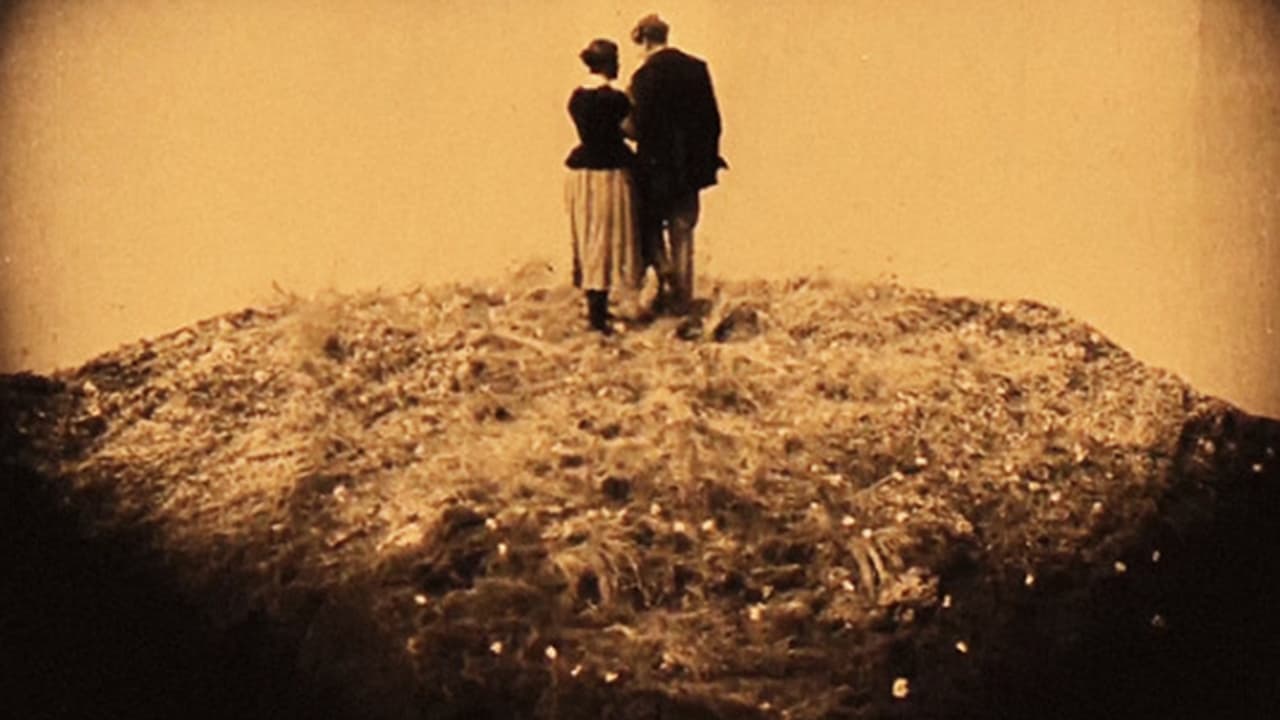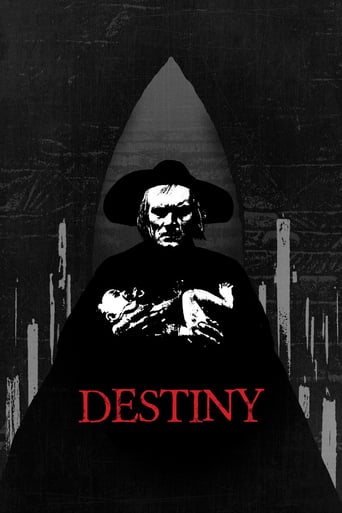

I wonder what he is today, almost a 100 years later. "Destiny" is a silent movie by famous German director Fritz Lang and it runs for 100 minutes, at least the version I watched. Lang gut help with the script once again by Thea von Harbou, with whom he worked together on a regular basis. This was a very early project of the two, considerably before "M" and "Metropolis". Both were around 30 years of age at this point. The story is as follows. Two people are madly in love, but sadly for the guy the time has come and Death takes him on his last journey. The woman will not accept it and begs Death until he finally gives in and giver he the chance to win his beloved back. People about to die are symbolized by candles who are about to go out. Death shows her 3 candles who are about to go out soon and tells her that if she can keep one of these from going out, then she will get her beloved back. But this is where the contradictions start. If a man's time has come, then there is no way in keeping him from dying. Death said so himself earlier in the film. So is he just toying with her?Maybe, as the woman does not manage to save a single one of these three souls. So, she gets another chance... I always think of Death as a relentless character and I just cannot understand how he shows mercy so many times in this film that he would even give her another chance at the end. I quite liked the core action here. I only wondered why they would introduce all the townsfolk in the pub early on if they don't play a role at all later as the film progresses. But it wasn't bad and the actual idea of those 3 challenges is a decent one too. However, it hurts in terms of predictability. It was so clear that she would at least fail the first two, so this was basically half an hour wasted and we knew the outcome anyway. Apart from that, I did not like these 3 sequences anyway. Putting her in completely different regions of the world was a nice idea, but everything that happened during these 3 parts was just so uninteresting and I never really felt for her and prayed that she would manage to save the guy. The ending wasn't bad either. I read the core plot afterward, but this film was just so confusing at times that it was really difficult to understand what exactly was going on. I would definitely prefer it as a book version and I am not even a great reader. Then again, I am not the greatest silent movie fan either. Giving this one a chance does not change my perception that the genre is generally not too interesting and certainly not my cup of tea. Dagover did not impress me really here, but the actor who played Death was pretty good. I recommend "Destiny" only to silent film lovers. Everybody else will not enjoy it.
... View MoreA young couple encounter Death in a country tavern while on a journey, and he claims the man. The man's young wife tracks Death down and pleads with him to return her husband to her. He promises to do so if she can prevent any one of three imminent deaths, each represented by a burning candle that has nearly burned out.The subject of death is a ripe one for the cinema, and probably the most famous example of a living person attempting to bargain with death is Bergman's The Seventh Seal, but this silent movie from Fritz Lang is possibly more accessible to the casual viewer. Death here is something of a sympathetic character - and he is a character rather than just a representation - slavishly following the laws laid down by God, but wishing for a release from his responsibilities. He's played here by Bernhard Goetzke, a hollow-cheeked man with searing eyes who certainly looks the part.All of the principle characters play multiple roles, perhaps to emphasise the inevitability of death for us all and the futility of attempting to escape it (or maybe to cut down on costs - who knows?) The film looks great, with some striking images and impressive sets. It's true that the film does drag a little in the second act in which three short stories are played out, taking the action away from the main story and thus bringing that part of the film to a screeching halt.Der Mude Tod is one of those films that will no doubt entrance lovers of silent or early German cinema but which is unlikely to convert many to the genre. Fritz Lang's direction is crisp and imaginative and there's something almost intangible about it that suggests a young director at the outset of his career.
... View MoreThis early Fritz Lang picture made quite a splash among his fellow filmmakers. Hitchcock's favourite film, catalyst for Luis Bunuel's career, inspiration for many of the devices in the Douglas Fairbanks Thief of Bagdad and even one or two ideas in Powell and Pressburger's Tales of Hoffman, Der Mude Tod certainly has a lot to answer for.This was also Lang's first collaboration with wife-to-be Thea von Harbou. The influence of a more talented screenwriter is clear, as this boasts a far stronger narrative than his earlier Spiders pictures, which he penned himself. The main storyline was famously inspired by a dream that Lang once had. I've lost track of the number of times I've woken up from a dream, thinking it was a fantastic idea for a screenplay, only to realise once I was properly awake it was unworkable. Lang and Harbou have done a good job then of weaving a fairly coherent story out of what is after all the product of someone's unconscious mind. And yet there are a number of weaknesses to it. For example, why is it necessary to introduce us individually to all the town's notaries, when their identities are of so little importance to the plot? This is at the expense of the principle characters, none of whom is fully rounded.However, while Lang often failed to balance out a story, he had a real sense of structure when it came imagery and tone. Here was a director who truly thought in images and not words. If you look at Lang's greatest silent pictures, especially Metropolis, they are structured – often literally – like works of classical music, with calm passages giving way to more dynamic movements. You can see the beginnings of that trend here – the framing story in the German town is slow and appropriately dreamlike in its imagery. Then there is a sudden contrast with the burst of action that opens the story of the first light, and this frantic pace is kept up throughout the first and second stories. For this reason the third story, for all its special effects, is the weakest for me because it loses the pace of the first two and is the least tight in its construction.The individual image was also highly important to Lang. Whereas his contemporaries in German cinema were doing everything with shadows and superimpositions, Lang often achieves greater effect with his manipulation of space. He had already experimented with scenery and space in his earliest films, but by now a very definite approach is beginning to emerge. Lang often likes show us a scene from two opposing camera angles, showing us the completeness of a set and making it feel real to the audience. He is not afraid to break the line of action – switching the camera from one side of the actors to the other - generally a directorial no-no, but to be honest it only causes confusion when everything is shown in close-ups and the space where the action takes place is not well defined. In Der Mude Tod, as with many of Lang's films, every shot seems calculated to suggest enclosure and entrapment – very apt for the theme of inescapable fate. On small sets, rear walls are often at 45-degree angles to the camera, so they appear to hem in the actors, while on the larger sets the sheer cavernous size of the room makes the actors appear tiny. Even in the outdoor scenes the action is often framed by an overhanging tree.In spite of his constant attention to the architecture, Lang is now paying a bit more attention to his actors. The performances are comparatively restrained for a German silent film, with Lil Dagover resisting the temptation to slip into melodrama, and the always watchable Rudolph Klein-Rogge in the most normal, human role I have ever seen him in.In Der Mude Tod, we see the first flourishing of Fritz Lang's genius. He is just a few films away from perfecting his technique. Still, the picture suffers somewhat from the same problem as many "effects movies", in that it is an impressive show without enough substance to back it up – in this case the main defect is a lack of well-defined characters.
... View MoreThe films of Weimer Germany are an interesting and exciting period to study. They share a rich cultural heritage, similar themes and revolutionary film styles and techniques. "Destiny" (Der Müde Tod) is the earliest mature work I've seen from Fritz Lang, one of the period's principal filmmakers--much better than the Spiders films. It's expressionistic, in the loose sense usually applied to these films, which is to say it's thematically dark and, occasionally, photographed and designed intentionally to affect mood and express emotions. An exceptional crew of cinematographers and art directors, as in many of the best films of the period, support the director.Yet, I think the narrative has its faults; the frame narrative is great, but only the last of the three episodes within was entertaining--for its light and magical treatment. In the film, a girl's young lover dies, and Death offers her three tries to resurrect his life. The episodes are flimsy at times, but some impressive imagery and powerful performances by Lil Dagover and Bernhard Goetzke make up for much of that. Additionally, the exotic Arabian, historical Venetian and Chinese settings for the three inner episodes are well rendered, surely, but it's the haunting graveyard scenes and the meetings with Death, especially the room of candles scenes, that I'll remember. They're not merely exotic; they're otherworldly--the atmospheric, moving and imaginative places I want movies to take me.
... View More